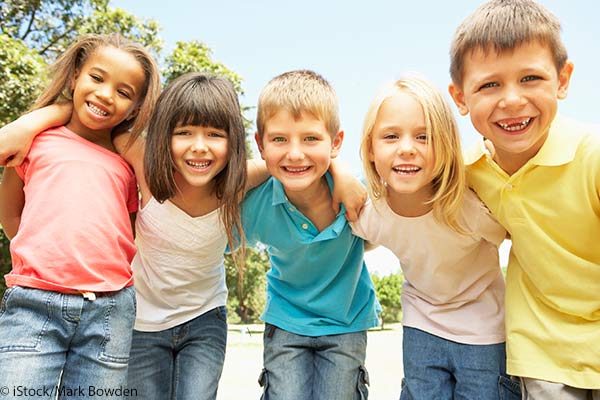I call 4- and 5-year-olds the “adolescents of early childhood” because, emotionally speaking, they are going through many of the same things that preteens and teenagers experience. Children of this age generally feel pretty capable and on top of their world. They have fairly good communication and physical skills, and they are beginning to really understand how school and home life work.
Four- and 5-year-olds are also working on developing their own identity separate from their parents’. To define it, they often assert themselves through lack of cooperation. At the same time, they are establishing friendships and learning how to manage them. While they have a desire to connect to their peers, they also are very egocentric and have a hard time understanding or caring about others’ feelings or needs. They want to be and have friends, but they also want everything their way, so how can we help them develop friendship skills? Here are some suggestions:
- We can help children learn how to join into group play by teaching them how to observe what the children in a group are doing and then come in with an idea of how they can contribute to the play. Telling a child to walk up to a group and ask “May I play?” is setting her up for rejection. However, coming up and saying “Would you like to use my bucket?” is much more likely to be greeted with a “Thanks! You can use mine!”
- We can teach children to be supportive and approving by modeling good eye contact, giving compliments, and showing interest in what others are doing. When you see your child doing this, it is always a good idea to tell him how friendly he is being.
- We all know that kids are brutally honest and say the “darndest things,” but learning to exercise tact is an important part of learning to think about how her behavior affects her friend. It helps to reflect how her words might make other people feel, even though she is probably not trying to hurt anyone’s feelings.
- Whenever kids get together, conflicts are bound to happen — it is natural. It is not reasonable or desirable to expect children to avoid conflict. Instead, we want to teach them problem-solving skills to resolve conflicts, including:
- Neutralizing the situation by calming emotions.
- Gathering information by listening to each child talk about the conflict from his perspective.
- Defining the problem so the children understand what the conflict is about.
- Brainstorming as many solutions as possible to solve the problem.
- Evaluating the suggestions to determine which are and are not doable.
- Choosing a solution and making a plan to implement it.
- Following through with the plan.
This last step may be one of the most important things children learn in preschool. At first, they will need adults to facilitate the process, but when they get good at it, they can manage much of it on their own. You can model this at home with siblings, too. These problem-solving skills will be very valuable on the playground in elementary school—and in all kinds of relationships for the rest of their lives.
Many children seem to have these skills naturally, but others benefit from more specific guidance in these areas. Taking the time to focus on friendship skills with your 4- and 5-year-olds will help them be the kind of friends who have positive relationships in all areas of their lives. What could be more important?
Stephanie Agnew, BA, is the Parent Education Coordinator at San Mateo Parents Place.



